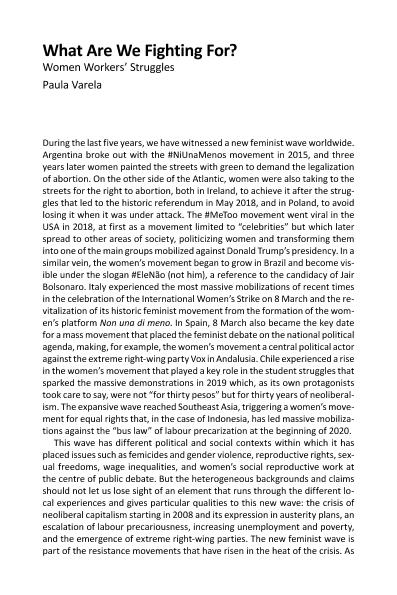Capítulo de Libro
What Are We Fighting For?: Women Workers’ Struggles
Título:
¿Por qué estamos luchando?: Luchas de las Mujeres Obreras
Título del libro: If Not Us, Who?: Global workers against authoritarianism, fascism, and dictatorships
Varela, Paula

Otros responsables:
Azzellini, Darío
Fecha de publicación:
2021
Editorial:
Rosa-Luxemburg-Stiftung
ISBN:
978-3-96488-088-8
Idioma:
Inglés
Clasificación temática:
Resumen
During the last five years we have witnessed a New Feminist Wave worldwide. Argentina broke out with the #Niunamenos in 2015 and three years later painted the streets with green to demand the legalization of abortion. On the other side of the Atlantic, women were also winning the streets for the right to abortion, in Ireland to achieve it after the struggles that led to the historic referendum in May 2018; in Poland to avoid losing it in a context where it was being attacked. The United States viralized the #MeToo in 2018, at first as a movement limited to "celebrities" but later spread to other layers of society, politicizing women and transforming them into one of the main actors mobilized against Donald Trump`s presidency. In a similar vein, the women`s movement began to grow in Brazil and become visible in the heat of the slogan "Ele nao" in reference to the candidacy of Jair Bolsonaro. Italy experienced the most massive mobilizations of recent times in the celebration of the International Women´s Strike of March 8 and the revitalization of its historic feminist movement from the formation of the women´s platform "Non di una Meno". In Spain, the March 8 also became the key date for a mass movement that placed the feminist debate on the national political agenda, making, for example, the women´s movement a central political actor against the extreme right-wing party Vox in Ansalusia. Chile experienced a rise in the women`s movement that was key in the student struggles that sparked the massive demonstrations in 2019 which, as its own protagonists took care to say, were not "for thirty cents" but for thirty years of neoliberalism. The expansive wave reached Southeast Asia, triggering a women´s movement for equal rights that, in the case of Indonesia, has led massive mobilizations against the "bus law" of labour precarization at the beginnig of this year.In this article, I address the relationship between the rising women?s movement and the struggles of working women in the context of the crisis of neoliberal capitalism taking three considerations into account. First, social reproduction framework as the one which let us understand the leading role of women in the working class struggles. Second, when we speak of social reproduction, we are not referring only to what happens in the household but what happens in thousands of workplaces where, mainly women, carry out reproductive work (hospitals, schools, fast food chains, cleaning services, etc).1 The recognition of these two forms of social reproduction work (unpaid and waged) is fundamental for understanding the centrality of women in the contemporary working class` morphology. Furthermore, it is critical because social reproduction`s institutions have been one of the main focuses of neoliberal austerity plans world-wide. Third, this social reproduction approach allows us to bring light to workers` struggles as exceeding economical demands and introducing claims that are being violently attacked by capital and ruling class states.
Palabras clave:
FEMINISMO
,
GENERO
,
CLASE TRABAJADORA
,
MOVIMIENTOS SOCIALES
Archivos asociados
Licencia
Identificadores
Colecciones
Capítulos de libros(CEIL)
Capítulos de libros de CENTRO DE ESTUDIOS E INVESTIGACIONES LABORALES
Capítulos de libros de CENTRO DE ESTUDIOS E INVESTIGACIONES LABORALES
Citación
Varela, Paula; What Are We Fighting For?: Women Workers’ Struggles; Rosa-Luxemburg-Stiftung; 2021; 23-31
Compartir



